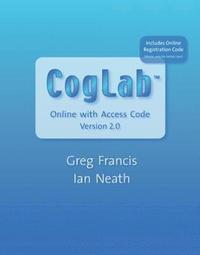
- Format
- Mixed media product
- Språk
- Engelska
- Antal sidor
- 160
- Utgivningsdatum
- 2006-08-01
- Upplaga
- 4
- Förlag
- Wadsworth Publishing
- Medarbetare
- Francis, Greg
- Illustrationer
- illustrations
- Dimensioner
- 266 x 209 x 6 mm
- Vikt
- Antal komponenter
- 2
- Komponenter
- Online resource (1), Paperback (1)
- ISBN
- 9780495107781
- 430 g
Kundrecensioner
Fler böcker av Ian Neath
-
Principles of Memory
Aime M Surprenant, Ian Neath
In over 100 years of scientific research on human memory, and nearly 50 years after the so-called cognitive revolution, we have nothing that really constitutes a widely accepted and frequently cited law of memory, and perhaps only one generally ac...
Recensioner i media
Tim Klitz, Washington & Jefferson College: "Since I have the co-creator of CogLab in my email box, I just wanted to tell you how very very happy I have been with the CogLab product. I've been using CogLab for a number of years, and it has allowed me to turn my "regular" Cognitive Psychology class into a much better class by integrating labs throughout the term. The improvements in CogLab 2.0 have also been nice as well, including the ability to look at individual, group, and national data, and some small changes in the labs that have matched the methodologies closer to the original studies. I can't imagine the amount of work that went into creating CogLab, and I'm sure just as much work has gone into keeping servers up to speed, updating labs, etc. Thank you for creating such a fabulous product!"
Övrig information
Ian Neath is a professor in the Department of Psychology at Memorial University of Newfoundland, Canada. He received his Ph.D. in cognitive psychology from Yale University in 1991. His research currently focuses on seeking evidence for general principles of memory that apply widely over different time scales, different tests, and different hypothetical underlying memory systems. In addition to publishing many articles on memory in peer-reviewed journals, he co-authored the Cengage textbook HUMAN MEMORY: AN INTRODUCTION TO RESEARCH, DATA, AND THEORY, 2nd edition; COGLAB on a CD; and COGLAB Reader. Greg Francis is a professor in the Department of Psychological Sciences at Purdue University. He earned his Ph.D. in cognitive and neural systems from Boston University in 1993. His research investigates properties of neural networks and visual perception. He also was co-author of the COGLAB Reader, COGLAB on a CD, and Social Psychology Laboratory.
Innehållsförteckning
Part I: ATTENTION.
1. Attentional Blink.
2. Simon Effect.
3. Spatial Cueing.
4. Stroop Effect.
Part II: PERCEPTION.
5. Apparent Motion.
6. Garner Interference.
7. Muller-Lyer Illusion.
8. Signal Detection.
9. Visual Search.
Part III: NEUROCOGNITION.
9. Brain Asymmetry.
10. Blind Spot.
11. Receptive Fields.
Part IV: SENSORY MEMORY.
12. Metacontrast Masking.
13. Modality Effect.
14. Partial Report.
15. Suffix Effect.
Part V: SHORT-TERM MEMORY.
16. Brown-Peterson.
17. Position Error.
18. Sternberg Search.
Part VI. Working Memory.
19. Irrelevant Speech Effect.
20. Memory Span.
21. Operation Span.
22. Phonological Similarity Effect.
Part VII: MEMORY PROCESS.
23. Encoding Specificity.
24. Levels of Processing.
25. Serial Posiion.
26. Van Restorff Effect.
Part VIII: Metamemory.
27. False Memory.
28. Forgot-It-All-Along.
29. Remember/Know.
Part IX: Imagery.
30. Link Word.
31. Mental Rotation.
Part X: Speech and Language.
32. Categorical Perception-Identification.
33. Categorical Perception-Discrimination.
34. Lexical Decision.
35. Word Superiority.
Part XI: CONCEPTS.
36. Absolute Identification.
37. Implicit Learning.
38. Prototypes.
Part XII: JUDGEMENT.
39. Monty Hall.
40. Decision Making.
41. Risky Decisions.
42. Typical Reasoning.
43. Wason Selection Task.
